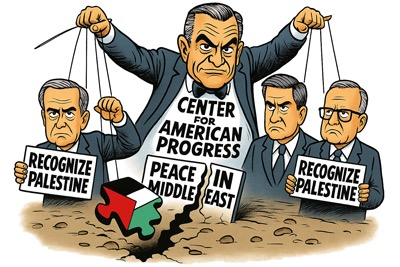
This past week, Canada, the UK and Australia have formally recognised the State of Palestine. There is now a decent possibility that the declaration of Israeli sovereignty over the West Bank is likely to follow. Hamas is now further from agreeing to a deal than ever, as they are rewarded for 7th October and riding high in Palestinian polling. Peace in the Middle East looks further away than ever, thanks to this foolish and premature move.
There is more to it, though. How did these three countries align and synchronise in this manner?
The Hidden Hand of the Center for American Progress (CAP)
An influential progressive think tank, aligned with Qatar's agenda, has been quietly orchestrating a significant shift in Western policy towards Israel and Palestine. The Center for American Progress (CAP), a Washington, D.C.–based NGO described by critics as a "pro-Qatar" organisation, has used its global network to encourage allied governments to recognise a Palestinian state and adopt more hardline positions against Israel.
Under its international initiative Global Progress Action (GPA), CAP has brought together progressive leaders from Canada, Australia, the UK, and beyond at high-level summits. Within months of these coordinated gatherings, left-leaning governments across several countries publicly announced plans to recognise Palestine formally, echoing talking points remarkably similar to those crafted by CAP's policy arm.
This orchestrated campaign constitutes a diplomatic coup. It advances Qatar's interests by isolating Israel, but it also produces dangerous side effects. As CAP/GPA's influence has increased, all three Western countries involved have adopted sharply adversarial policies towards Israel, accompanied by a rise in antisemitic incidents at home.
The evidence indicates that this is no coincidence: CAP and its GPA affiliate have promoted a narrative that delegitimises Israeli actions and extols the Palestinian cause, fostering an environment permissive to hostility towards Jews. What follows is an exposé of how this NGO network, funded and flattered by Doha, manipulates democracies abroad while secretly tolerating hatred within their borders.
CAP Does the Political Bidding of Qatar
Founded in 2003, CAP has long been a pillar of the American left, but in recent years its stance on Middle East issues has noticeably shifted in favour of Qatar's foreign policy goals. Reports suggest that CAP's close engagement with Qatari institutions is evidence of their increasing tilt towards Doha; for instance, sending senior officials like COO Gordon Gray to forums at Georgetown's Qatar campus. CAP's reports on Gulf affairs frequently portray Qatar positively (as a victim or mediator), while sharply criticising its regional rivals such as Saudi Arabia and the UAE. Although CAP denies any direct funding from Qatar, its consistent alignment with Qatar's narrative has raised eyebrows in policymaking circles, earning CAP a reputation as a de facto pro-Qatar advocacy organisation.
It is against this backdrop that CAP's Global Progress Action initiative must be understood. GPA is essentially CAP's international arm – an "incubator" for progressive strategies on a global scale. Launched through CAP's 501(c)(4) Action Fund, GPA acts as a hub connecting left-of-centre parties and leaders across countries. Notably, Qatar's interests align perfectly with GPA's recent focus: using Western progressives to promote policies that pressure Israel and bolster the Palestinian cause. By advocating for "inclusive societies" and opposing "authoritarianism" abroad, CAP cloaks its Qatar-friendly agenda in the language of human rights and democracy. This clever disguise has deceived many well-meaning liberals.
The main vehicle for CAP/GPA's influence has been a series of Global Progress Action Summits. These glamorous high-level gatherings bring together prominent progressive politicians, strategists, and activists from around the world.
At the 2024 summit in Montréal, for instance, global progressive elites assembled under CAP's guidance to "collaborate on bold new ideas" for governance. The key figures alone demonstrate the network's reach: Canada's Prime Minister Justin Trudeau shared the stage with former New Zealand Prime Minister Jacinda Ardern and Mark Carney (then a UN envoy and Canada 2020 think-tank chair, now Canada's Prime Minister). Also present was Paul Ovenden, Director of Political Strategy at 10 Downing Street until last week – a top aide to British Labour Prime Minister Keir Starmer, reflecting that party's support. CAP Action's CEO Patrick Gaspard and Canada 2020's CEO Braeden Caley (a key summit organiser) explicitly described the gathering as an "essential" meeting of the "global progressive movement" to strategise against common adversaries
The Role of the CAP Summits
These summits serve as transnational war rooms for the progressive left. Behind closed doors, CAP's operatives share polling, messaging, and policy templates, aligning strategies across continents. It is no coincidence that senior campaign operatives from multiple countries are deeply involved in GPA's activities.
In Canada, Liberal Party strategist Tom Pitfield (a long-standing GPA partner) and Braeden Caley were crucial in planning the Montréal summit; within months, Pitfield became principal secretary to new PM Mark Carney, and Caley his deputy chief of staff.
In Australia, Paul Erickson, the Labor Party's national secretary and campaign director for PM Anthony Albanese, has likewise been a GPA participant and conduit for CAP's ideas.
In Britain, Starmer's team has relied on Paul Ovenden (the No. 10 strategy chief who joined GPA forums) to introduce CAP-endorsed tactics into UK Labour's playbook. Through these "GPA partners" embedded at the highest levels of Canadian, Australian, and British politics, CAP quietly influences the direction of left-wing parties, especially on foreign policy towards the Middle East.
A Striking Pattern in the Recognition of Palestine
One striking pattern emerged on Sunday: within minutes, progressive-led governments in Canada, the UK, and Australia all recognised a Palestinian state, a policy long championed by the far left but historically resisted by the political mainstream. The coordination was palpable. On 30 July 2025, Canada's newly appointed Prime Minister, Mark Carney, announced that Canada "intends to recognise the State of Palestine at the 80th Session of the U.N. General Assembly in September 2025" – a radical shift after decades of aligning with Israel. Carney justified the move by citing collapsing prospects for a negotiated two-state solution, blaming both Hamas terror and Israeli settlement expansion and annexation votes. Crucially, his statement stressed that Canada's recognition is conditional: the Palestinian Authority must enact governance reforms, hold elections (excluding Hamas from power), and commit to demilitarisation. In other words, Carney framed a dramatic pro-Palestine step as an effort to "save" the two-state solution from Israeli intransigence and Hamas' malign influence.
Carney's declaration follows similar announcements by France and the UK to recognise Palestine formally. Indeed, just days earlier, Britain had clarified its position. Keir Starmer stated that the UK "would recognise the state [of Palestine] in September unless the Israeli government takes substantive steps to end the appalling situation in Gaza, agree to a ceasefire and commit to a long-term, sustainable peace".
An Unprecedented Ultimatum to Israel
This ultimatum, threatening to recognise Palestine if Israel didn't halt its military campaign, was unprecedented for a major Western power. It signalled a complete break from the traditionally staunch pro-Israel stance of Britain's foreign policy, and Starmer's language closely mirrored the demands of progressive activists during the Gaza conflict.
Then came Australia, which had already moved towards a pro-Palestinian stance under Labour. On 11 August 2025, Prime Minister Anthony Albanese, along with Foreign Minister Penny Wong, announced that "Australia will recognise the State of Palestine at the 80th UN General Assembly in September." The Australian government framed this as a way to support "international momentum" for a two-state solution and a Gaza ceasefire. Echoing Carney, Canberra highlighted new "major commitments" by the Palestinian Authority as justification, such as ending payments to terrorists and reforming schools, while explicitly condemning Israel's actions. Albanese himself admitted that the timing of the recognition was aimed at "achieve a breakthrough in negotiations," asserting lifelong support for both Israel's security and Palestinian statehood.
Thus, within a few weeks, Ottawa, London, and Canberra all aligned behind the same historic policy shift that was enacted today: immediate recognition of Palestine, conditional on certain criteria, as a means to apply pressure on Israel. They were soon joined by others, including New Zealand and several European states, in what was described as a wave of historic global momentum for Palestinian statehood. It is hard to imagine such coordination occurring by chance.
All signs suggest that CAP's Global Progress network facilitated this wave: the New York meeting, where a joint declaration was drafted (the so-called "New York Call" published by France), included Canada, the UK, Australia, New Zealand, and others, all pledging to recognise Palestine. That declaration explicitly reaffirmed commitment to two democratic states and the unification of Gaza and the West Bank under the Palestinian Authority – themes also highlighted by Carney, Starmer, and Albanese in their speeches. Essentially, the GPA summits and side meetings acted as the organising hubs: progressive governments exchanged ideas and decided to act together. CAP's influence was covert but vital in this choreography.
Why Do the New Declarations Sound Familiar?
If the policies being adopted now sound familiar, it is because CAP pre-wrote much of the script. On 15 May 2024, as the Gaza war and its fallout dominated headlines, the Center for American Progress published a policy manifesto titled Principles and Positions on Israel and Palestine. This document can only be described as a progressive blueprint for rebalancing Western policy away from Israel. It called for what would once have been unthinkable for a mainstream D.C. think tank: suspending arms transfers to Israel due to alleged war crimes, holding Israeli officials accountable under international law, and pushing aggressively for Palestinian rights and statehood.
CAP did not mince words – it labelled Israel's occupation since 1967 as "illegal," deemed Israel's recent military offensive in Gaza "indiscriminate...represent[ing] grave violations of international humanitarian law," and urged the US to halt lethal aid until Israel protects civilians and averts famine in Gaza. Simultaneously, CAP condemned Hamas's atrocities on 7 October and supported efforts to bring Hamas terrorists to justice, but the main message of the paper was clear: Western nations must leverage their power to force a change in Israel's behaviour, while prioritising the Palestinian cause.
One particularly revealing section of CAP's manifesto praised President Biden's then-new Executive Order authorising sanctions on individuals involved in West Bank settlement expansion: "a welcome step to accountability for illegal settlement expansion," CAP wrote, adding "the administration must apply these sanctions to all those responsible...to curtail continued illegal activity". Fast-forward one year, and this is exactly the stance taken by progressive governments abroad. The conditional recognitions of Palestine by Canada and others carry an implicit threat of sanctions and isolation for Israeli officials who continue expanding settlements or resisting peace efforts.
CAP Instigates the Moves Against Israel
In essence, CAP provided intellectual ammunition and moral cover for friendly governments to take unprecedented steps against Israel. By May 2024, CAP had established the rationale; by mid-2025, its GPA allies were implementing it. The CAP–GPA network thus served as a policy transmission belt, facilitating a progression from think-tank white papers to coordinated action by multiple national governments, all in pursuit of a progressive realignment on Israel-Palestine.
It is crucial to recognise that Qatar's influence is evident throughout this agenda. Qatar is a key supporter of Hamas and has long sought greater international recognition of Palestinian claims (even as it plays double games mediating hostage releases). CAP's positions (demanding a ceasefire, highlighting Palestinian humanitarian needs, condemning Israeli military tactics, and prioritising "Palestinian self-determination" in peace efforts) could have been taken directly from Qatari diplomats' speeches. The difference is that CAP cloaks these stances in the credibility of a Western liberal institution and then spreads them through influential progressives worldwide. It is a nuanced influence operation: CAP is the idea factory and GPA is the distribution network, ultimately hijacking the foreign policies of democratic nations to align with Doha's objectives. That is why this seemingly benevolent push for Palestinian statehood must be recognised for what it truly is: a dangerous, foreign-aligned campaign masquerading as grassroots progressive policy.
The Grand Strategy
What we are witnessing is the culmination of a polemical grand strategy orchestrated by a supposedly progressive NGO that is anything but benign. The Center for American Progress and its Global Progress Action network have exploited the goodwill of the left (its desire for peace, justice, and human rights) to advance a highly polemical, one-sided agenda scripted in Doha. This dangerous pro-Qatar NGO has succeeded in coordinating Western recognition of Palestine, an outcome Qatar's regime has long desired, by co-opting influential voices in Canada, Australia, the UK, and beyond. In doing so, CAP and GPA have helped install an anti-Israel orthodoxy in progressive governments, strengthening the influence of left-wing elites under the guise of moral principles while marginalising more moderate or pro-Israel perspectives (indeed, far-left fringe parties were electorally crushed as their platforms were absorbed by the mainstream left, which then moved even further left).
The repercussions are profound. A key Western ally, Israel, finds itself diplomatically under siege not only from traditional opponents but also from friends who have embraced CAP's narrative. Western unity has fractured: while the United States (under Trump in 2025) stood resolutely with Israel, its allies in Ottawa, London, and Canberra have broken ranks, emboldening groups like Hamas by signalling international impatience with Israel. Qatar's propaganda could not have achieved this alone; CAP provided the professionalism and networks to turn it into reality. As a final indignity, Jewish communities in those very countries have been left to bear the brunt, facing increased threats and violence as
Why CAP is So Dangerous
It is time to expose this cynical game. When a think tank, armed with influence and linked to foreign interests, orchestrates policy from behind the scenes, democracy is undermined. When that policy happens to appease terrorists and threaten minority communities at home, it must be revealed and denounced. CAP and GPA cloaked themselves in progressive rhetoric, but their campaign to coordinate recognition of Palestine, however well-intentioned some participants may be, is anything but a simple fight for human rights. It is a geopolitical power move that has compromised the moral integrity of progressive governments, turning them into instruments of a despotic Gulf state's agenda and weakening the global stance against jihadist terrorism.
The lesson here is clear: beware the "friendly" NGO that talks of peace but takes sides in a brutal conflict. By supporting the discrediting of Israel, CAP and Global Progress Action have shown their true colours. They are not defenders of liberal values but agents of division. The free nations of the world must recognise this and adjust accordingly. Supporting a two-state solution and Palestinian rights does not have to mean undermining Israel's existence or condoning hatred. It is possible to promote justice without bowing to Qatar.
Those truly committed to peace and liberal democracy must root out the toxic influence of groups like CAP/GPA from the halls of power. Transparency and accountability are key: voters deserve to know which foreign players and ideologues are influencing their leaders. Only then can we ensure that "global progress" is more than a marketing slogan: that it actually means progress for all people, and not the agenda of an authoritarian benefactor hidden in the shadows.
This article was originally published on Substack
 Andrew Fox is a former British Army officer. Recent senior lecturer at the Royal Military Academy Sandhurst. Masters study in Middle Eastern strategy and Psychology. Now a think tank research fellow focusing on Defence, the Middle East and Disinformation. Read more about Andrew on his website. Follow Andrew on Substack
Andrew Fox is a former British Army officer. Recent senior lecturer at the Royal Military Academy Sandhurst. Masters study in Middle Eastern strategy and Psychology. Now a think tank research fellow focusing on Defence, the Middle East and Disinformation. Read more about Andrew on his website. Follow Andrew on Substack



 Emerson on Jihadi Terrorism in 2025
Emerson on Jihadi Terrorism in 2025
 The Rise and Fall of the Misconceptions From the River and the Sea
The Rise and Fall of the Misconceptions From the River and the Sea
 Qatar: the Real Perpetrator of the October 7th Massacre
Qatar: the Real Perpetrator of the October 7th Massacre